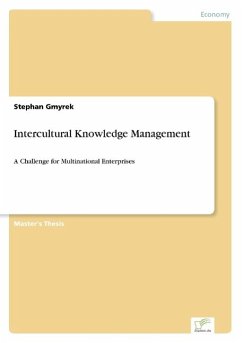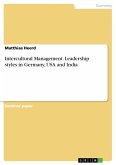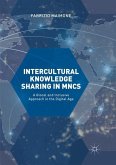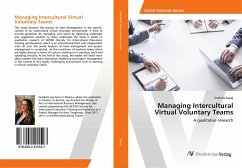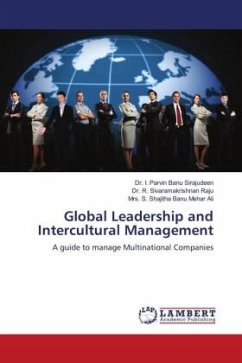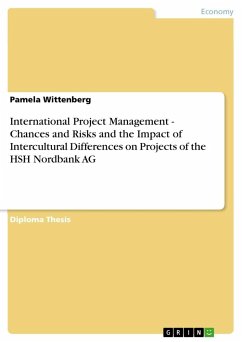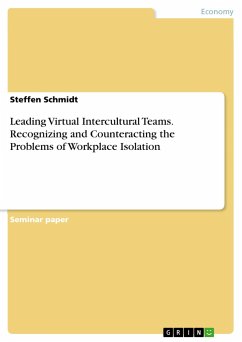Master's Thesis from the year 2002 in the subject Business economics - Business Management, Corporate Governance, grade: 1,7, University of Applied Sciences Bremen (Wirtschaftswissenschaften), language: English, abstract: Inhaltsangabe:Abstract:
It was in the mid 1990 s, when the world of business has recognized the importance of continuous innovations and intensive knowledge sharing. New management concepts such as performance, innovation and knowledge management increasingly emerged. This will undoubtedly determine the future success or failure of multinational enterprises, facing unpredictable market situations.
Since business has moved towards a knowledge-driven economy, innovation and new knowledge creation become key factors for success within any industry. With the rise of the web and multimedia technologies, companies have become able to capture, store, organize, share and apply an enormous amount of information. Nowadays, important knowledge and expertise, which was captured in the heads of the employees in former times, should be attainable at any time and any place around the world. But is it like that in reality?
First of all knowledge management is a social process between individuals committed to constantly communicate explicit knowledge.
Successful knowledge sharing can not be based on technical instruments and databases. It is more a question of corporate culture.
Successful and effective knowledge sharing can only be realized by people with a great corporate understanding, values, culture and leadership in order to avoid a culture of knowledge hoarding among the different departments or business units.
In intercultural context knowledge has got more dimensions and it is more subtle. People from different cultural background are shaped by different understandings of knowledge and it s communication. Because of that the approach for an effective intercultural knowledge management effort has be observed from different point of views. Only a very sensitive approach with the intention of deeply embedding it into the long term strategy of the company can guarantee lastingly success.
Today s multinational enterprises face new challenges. Since the beginning of the Internet Revolution in the early 1990s geographical barriers have become more or less unimportant. At the same time the globalisation process has moved on and international markets have been more and more deregulated. As a consequence international trade and business multiplied world-wide.
The time to market for new products decreased while the need to respond to new market conditions quickly increased. The main sources of competitive advantage - efficiency and quality are replaced by knowledge and innovation. Companies will have to provide continuous innovation in order to compete successfully in a global Marketplace.
The intention of the thesis is to sensitize the reader for the importance of knowledge management in the environment of multinational and multicultural companies. The reader is supposed to get some ideas of gaining competitive advantage by optimizing the spreading and usage of intangible assets within his company.
Business leaders should be convinced to give their employees more space to be creative and more opportunities to use their minds for the company s lastingly success.
After the introduction the first part of the paper discusses the state of the art in knowledge management. Some main models of the main authors of this topic are presented and discussed here. For example the four knowledge transformation types defined by Nonaka and Takeuchi are characterized in terms of the positional relations between the actors in corporate environment.
Further it is argued that knowledge creation does not require the support of large information bases and sophisticated information processing and retrieval systems; rather it requires an information and ...
Hinweis: Dieser Artikel kann nur an eine deutsche Lieferadresse ausgeliefert werden.
It was in the mid 1990 s, when the world of business has recognized the importance of continuous innovations and intensive knowledge sharing. New management concepts such as performance, innovation and knowledge management increasingly emerged. This will undoubtedly determine the future success or failure of multinational enterprises, facing unpredictable market situations.
Since business has moved towards a knowledge-driven economy, innovation and new knowledge creation become key factors for success within any industry. With the rise of the web and multimedia technologies, companies have become able to capture, store, organize, share and apply an enormous amount of information. Nowadays, important knowledge and expertise, which was captured in the heads of the employees in former times, should be attainable at any time and any place around the world. But is it like that in reality?
First of all knowledge management is a social process between individuals committed to constantly communicate explicit knowledge.
Successful knowledge sharing can not be based on technical instruments and databases. It is more a question of corporate culture.
Successful and effective knowledge sharing can only be realized by people with a great corporate understanding, values, culture and leadership in order to avoid a culture of knowledge hoarding among the different departments or business units.
In intercultural context knowledge has got more dimensions and it is more subtle. People from different cultural background are shaped by different understandings of knowledge and it s communication. Because of that the approach for an effective intercultural knowledge management effort has be observed from different point of views. Only a very sensitive approach with the intention of deeply embedding it into the long term strategy of the company can guarantee lastingly success.
Today s multinational enterprises face new challenges. Since the beginning of the Internet Revolution in the early 1990s geographical barriers have become more or less unimportant. At the same time the globalisation process has moved on and international markets have been more and more deregulated. As a consequence international trade and business multiplied world-wide.
The time to market for new products decreased while the need to respond to new market conditions quickly increased. The main sources of competitive advantage - efficiency and quality are replaced by knowledge and innovation. Companies will have to provide continuous innovation in order to compete successfully in a global Marketplace.
The intention of the thesis is to sensitize the reader for the importance of knowledge management in the environment of multinational and multicultural companies. The reader is supposed to get some ideas of gaining competitive advantage by optimizing the spreading and usage of intangible assets within his company.
Business leaders should be convinced to give their employees more space to be creative and more opportunities to use their minds for the company s lastingly success.
After the introduction the first part of the paper discusses the state of the art in knowledge management. Some main models of the main authors of this topic are presented and discussed here. For example the four knowledge transformation types defined by Nonaka and Takeuchi are characterized in terms of the positional relations between the actors in corporate environment.
Further it is argued that knowledge creation does not require the support of large information bases and sophisticated information processing and retrieval systems; rather it requires an information and ...
Hinweis: Dieser Artikel kann nur an eine deutsche Lieferadresse ausgeliefert werden.

